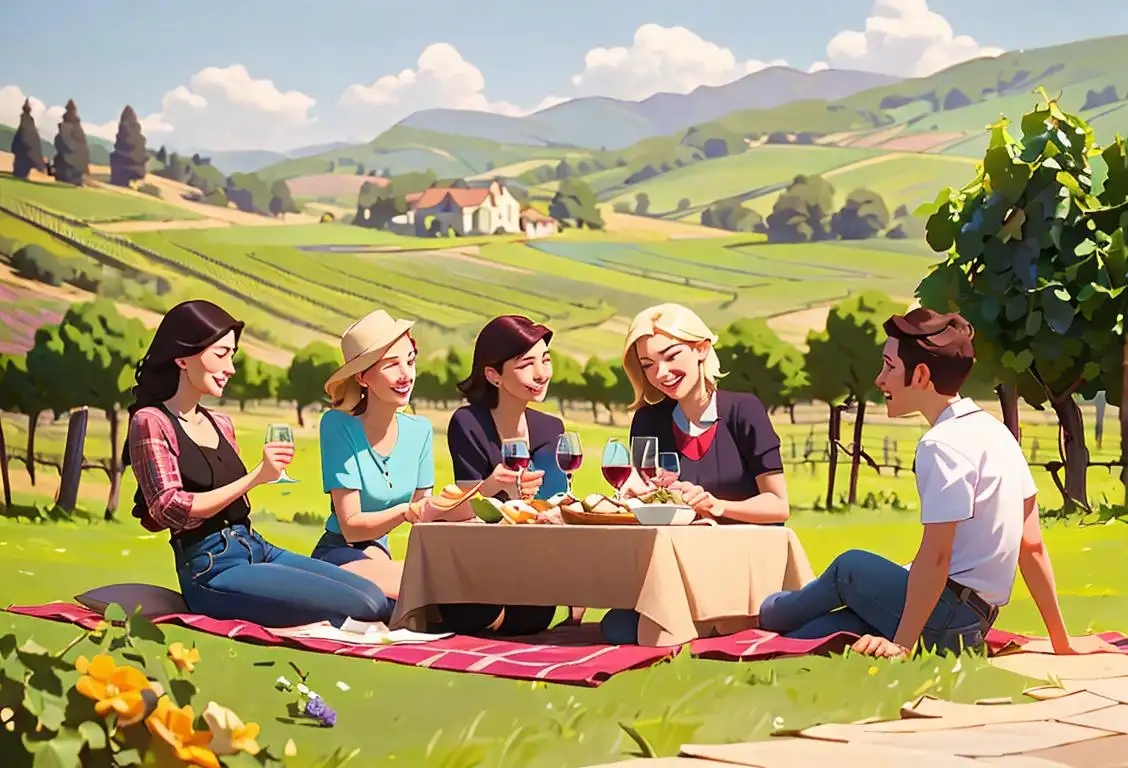National Wine Drinking Day

Ah, National Wine Drinking Day, a day that has seen us collectively raise our glass, and our internet voices, 2040 times, to toast to the heavenly nectar that is vino. But hold onto your corkscrews, because there is more to this day than just sipping and smiling.
When is Wine Drinking Day?
It's national wine drinking day on the 18th February.
A Sip Down Memory Lane
There's a certain, shall we dare say, 'bouquet', to the internet history of National Wine Drinking Day. And it all begins on a chilly winter day, February 18, 2016, when the internet was awash with the rich, robust hue of reds and the crisp, celebratory tone of whites. Hundreds of tweets, Facebook mentions, and Instagram posts toasted to wine's tantalizing touch to the tongue.
A Vineyard of Virtual Celebration
But how did we go about glorifying our grape-y go-to drink, you ask? It was an assortment of hilarious wine memes, creative DIY wine cork crafts and wine tastings done over video calls. It was like a grand vineyard had sprouted right in the center of the internet. Even folks who couldn’t tell a merlot from a malbec joined in, graciously going from amateur to aficionado.
A Toast to the Future
With each year, National Wine Drinking Day has only fermented, growing richer and fuller. From online wine-tasting parties to countless articles swirling with tips on food and wine pairings, this day has just gotten better with age. So, whether you're a lover of the heady cabernet, a fan of the sweet riesling or an enthusiast of the bubbly prosecco, it's time to clink those glasses and pour out the love and cheer.
History behind the term 'Wine Drinking'
6000 BCE
First Evidence of Wine Production
The origins of wine drinking can be traced back to around 6000 BCE in the region of modern-day Georgia. Archaeological evidence such as pottery jars and grape seeds suggest that early humans were fermenting grapes to make wine during this time. This marks the beginning of the long history of wine production and consumption.
700 BCE
Wine in Ancient Greece
During the ancient Greek civilization, wine played a significant role in their culture and social gatherings. Wine was often consumed during meals, and it was believed to have divine properties. Greek philosophers like Plato and Aristotle even discussed the effects of wine on individuals' behavior and society.
1st Century CE
Spread of Wine Drinking in the Roman Empire
The Romans inherited their love for wine from the Greeks and greatly expanded its consumption throughout their vast empire. Wine became a symbol of luxury and a staple of Roman banquets and celebrations. Vineyards were established in various regions, including Italy, Gaul (France), and Hispania (Spain), to meet the demand for wine.
12th Century
Wine in Medieval Europe
During the Middle Ages, wine drinking persisted and became associated with Christian religious practices. Monasteries played a crucial role in preserving and cultivating vineyards, as wine was used in Christian sacraments. Wine also held an important position in feudal society, with different classes having access to varying qualities of wine.
17th Century
Wine's New World Discovery
In the 17th century, European settlers began exploring and colonizing the New World. Wine was introduced to regions like California, South America, and South Africa, where the climate and terroir proved suitable for vine cultivation. This marked the expansion of wine production outside of traditional Old World wine regions.
19th Century
Industrialization and Wine's Global Reach
With the advent of industrialization, wine production underwent significant changes. Innovations such as the cork closure and the development of rail and steamship transportation enabled wine to be exported worldwide. Wine gained popularity across continents, and trading networks facilitated the distribution of diverse wine styles to different cultures.
21st Century
Wine Drinking in the Modern Era
In the modern era, wine has evolved into a global beverage enjoyed by people from various backgrounds. Wine consumption has become more diverse, with different regions gaining recognition for their unique wine offerings. Wine tourism has also flourished, with wine enthusiasts visiting vineyards and wineries to learn about the winemaking process and experience wine culture firsthand.
Did you know?
National Wine Drinking Day is so widely cherished online that, in 2016, it was the most mentioned day around February 18. That’s a whole lot of tweets about tannin!Tagged
romance awareness food fun loved onesFirst identified
17th February 2016Most mentioned on
18th February 2016Total mentions
2040Other days
Family Day
Action Day
Awareness Day
One Day
Opposite Day
Vodka Boyfriend Day
Kissing Fried Chicken Day
Happiness Day
Suicide Prevention Month Day
Believe Day









